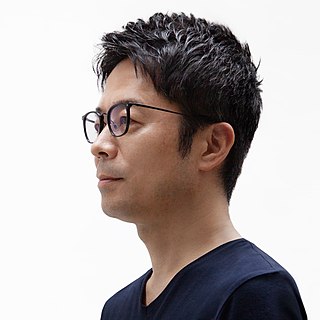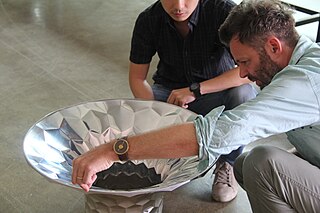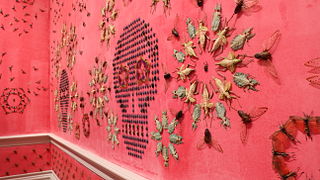Related Research Articles

The Design Museum in Kensington, London, England, exhibits product, industrial, graphic, fashion, and architectural design. In 2018, the museum won the European Museum of the Year Award. The museum operates as a registered charity, and all funds generated by ticket sales aid the museum in curating new exhibitions.

Bocci is a Canadian design and manufacturing company based in Vancouver and Berlin, founded in 2005 by Randy Bishop and Omer Arbel. Bocci specializes in sculptural lighting and large light installations.

Sir David Frank Adjaye is a Ghanaian-British architect who has designed many notable buildings around the world, including the National Museum of African American History and Culture in Washington, D.C.. Adjaye was knighted in the 2017 New Year Honours for services to architecture. He received the 2021 Royal Gold Medal, making him the first African recipient and one of the youngest recipients. He was appointed to the Order of Merit in 2022.
MAD Architects is a global design practice led by founder Ma Yansong, and partners Dang Qun, and Yosuke Hayano. MAD Architects boldly challenges conventions in thought, action, and spirit by pushing the boundaries of architecture, urbanism, interior and product design, fashion, and art. With offices located in Los Angeles, Rome, and Beijing, MAD's strength and inspiration comes from a team of over 150 architects and designers from 15+ countries representing all walks of life from every corner of the world.
London Design Festival is a citywide cultural event that takes place over nine days every September across London. It was founded by John Sorrell and Ben Evans in 2003 and celebrated its 22nd edition in September 2024. In an article by Wallpaper, the festival chairman stated, "We consciously founded the London Design Festival to be public-spirited. Over the last 20 years, the Festival has had incredible depth of penetration and success in bringing people together and distilling new ideas."

Ole Scheeren is a German architect, urbanist and principal of Büro Ole Scheeren with offices in Beijing, Hong Kong, London, Berlin and Bangkok and was a visiting professor at the University of Hong Kong from January 2010.

Cobe is a Copenhagen-based architectural firm owned and managed by architect Dan Stubbergaard. As of 2020, the office has 150 employees and is involved in a large number of projects throughout Europe and North America within urban planning, architecture, landscape architecture and interior design.
Rocco Design Architects Associates Limited, led by Rocco Yim, is a design architectural practice based in Hong Kong. It is responsible for the design of many iconic buildings in Hong Kong and Guangdong province, including the Hong Kong Government Headquarters, iSQUARE, One Peking Road, Yunnan Museum and Guangdong Museum. It employs 160 staff in Hong Kong and Shenzhen.

Tokujin Yoshioka is a Japanese designer and artist active in the fields of design, architecture and contemporary art. Some of his works are part of permanent collections in the Museum of Modern Art (MoMA), the Centre Pompidou in Paris, and the Victoria and Albert Museum in London. In 2007, he was named by Newsweek one of the 100 most respected Japanese in the world.

Fernando Mastrangelo is a New York-based artist best known for his collectible design, as well as his large scale sculptures and experiential installations. Mastrangelo is the founder of Fernando Mastrangelo Studio (FM/S).

Michael Young is a British industrial designer and creative director based in Hong Kong. He works in the areas of product, furniture and interior design with studios in Hong Kong and Brussels. He is known for unconventional use of materials and manufacturing processes, and collaborations with brands such as Brionvega, Cappellini, KEF, La Manufacture, and MOKE International. He is interested in "how disruption in society always has a design response, because it usually creates a need for things that perform."
Designboom is a daily web magazine headquartered in Milan and covering the fields of industrial design, architecture, and art internationally.
Winka Dubbeldam is a Dutch architectural designer and academic. After her education in architectural design at Columbia University, she established her own firm, Archi-Tectonics, in 1994 in New York City. Her use of a combination of sustainable materials, innovative and inventive building methods with adoption of digital techniques has rewarded her with many accolades for her architectural projects. She has earned a reputation as a leading figure in modern architectural designs which has also made her "a real estate newsmaker". She is a Professor and Chair of architecture at the University of Pennsylvania. She is also the RIBA External Examiner for the Bartlett UCL London [2018-2022], the Creative Director for the Venice Biennale Virtual Italian Pavilion [2021]. Her Ted talk “Crowdfunding Urban Planning” was in TED Global in Edinburgh Scotland 2013.

Jennifer Angus is a Canadian artist, professor, and author. She is known for her site-specific installations that use large numbers of insects arranged in ornamental patterns that she has been creating since 1999. Angus anthropomorphizes insects in the hope that she can change people's entomophobia and create an interest in the role that insects play in ecosystems.
Studio Drift is an Amsterdam-based artist duo founded by Ralph Nauta and Lonneke Gordijn in 2007. It specializes in choreographed sculptures and kinetic installations.
Bethan Laura Wood she is an internationally-recognised English designer of jewellery, furniture, decorative objects, lighting and installations. She has designed for such media as glass, laminates and ceramics. Work produced by her studio, WOOD London, is characterised by colour, geometry and visual metaphor, pattern and marquetry. She has been described as "[re-contextualizing] ... elements from everyday objects, often focusing on the pattern and coloration of objects as indicators of their origins, production, and past usage."
Sabine Marcelis is a Dutch artist and designer. Typically focused on themes of transparency, reflection, opacity and translucency, often using pastel colours, minimalist shapes, smooth surfaces, and materials such as resin, glass, and stone, she has described her work as “an investigation of light, how it can create effects and atmospheres."
Stephen Burks is an American designer and a professor of architecture at Columbia University. Burks is known for his collaborations with artisans as well as incorporating craft and weaving into product design. He is the first African American to win the National Design Award for product design.
Andrés Reisinger is an Argentinian visual artist and designer based between Madrid and Barcelona, Spain. He is the founder of Reisinger Studio, a multidisciplinary design studio with locations in Madrid as well as Barcelona. Reisinger is widely known for industrial design, craft, interior design and conceptual art.
References
- ↑ "The Alchemical Talent of Omer Arbel is in Full Display at Carwan Gallery's New Athenian Home". Yatzer. September 19, 2020. Retrieved January 6, 2021.
- 1 2 3 "Made in Vancouver: Omer Arbel | Vancouver Magazine". www.vanmag.com. Archived from the original on April 2, 2015.
- ↑ Plag, Celina. "Designer Omer Arbel: Der Erleuchter und sein ganz großer Traum". FAZ.NET (in German). ISSN 0174-4909 . Retrieved March 11, 2021.
- ↑ "Men's Epee (Junior)". Archived from the original on October 20, 2009.
- ↑ "1993 Team Canada Delegation"
- ↑ "A community centre in West Vancouver combines artistic and athletic programs under one big roof". Canadian Architect. January 2005.
- ↑ "Gleneagles Community Centre: Governor General's Medal Winner". Canadian Architect. May 2008.
- ↑ "Arbel has designs on the go". Vancouver Sun . May 30, 2008. Retrieved August 24, 2009.
- ↑ "Occupying and Activating: Omer Arbel Discusses Bocci's Spatial Approach to Design - Architizer Journal". Journal. July 18, 2016. Retrieved January 26, 2021.
- ↑ "The Secret of Bocci's Success". Azure Magazine. January 13, 2015. Retrieved January 26, 2021.
- ↑ Victoria and Albert Museum, Digital Media (October 7, 2013). "Video: London Design Festival - Installing the 28.280 Chandelier". www.vam.ac.uk. Retrieved January 26, 2021.
- ↑ "Omer Arbel suspends aluminium lighting sculpture above Barbican foyer". Dezeen. September 16, 2016. Retrieved January 26, 2021.
- ↑ Magazine, Wallpaper* (December 23, 2015). "Spheres of influence: a new base in Berlin gives design firm Bocci a chance to shine". Wallpaper*. Retrieved January 26, 2021.
- ↑ "Interactive floor plan: House 23.2, Canada | Architecture | Wallpaper* Magazine". Archived from the original on January 18, 2011. Retrieved January 14, 2011.
- ↑ "23.2 House | OAO - Omer Arbel Office". Archilovers. September 13, 2012. Retrieved January 11, 2021.
- ↑ "FUTURE PROJECTS HOUSE WINNER 2019". www.worldarchitecturefestival.com. Retrieved January 11, 2021.
- ↑ Magazine, Wallpaper* (February 4, 2020). "Omer Arbel's Pacific North West house is built on concrete 'lily pads'". Wallpaper*. Retrieved January 11, 2021.
- ↑ "Omer Arbel Office films concrete tree-like forms that will become House 75.9". Dezeen. July 21, 2020. Retrieved January 11, 2021.
- ↑ "Omer Arbel presents experiments with concrete at Particles for the Built World exhibition". Dezeen. June 9, 2019. Retrieved January 11, 2021.
- ↑ "Omer Arbel: Particles for the Built World | City of Surrey". www.surrey.ca. February 7, 2020. Retrieved January 11, 2021.
- ↑ "Omer Arbel - Architektonische Experimente in Material und Form - Aedes Architecture Forum". www.aedes-arc.de. Retrieved January 11, 2021.
- ↑ "Archived copy". Archived from the original on April 2, 2015. Retrieved March 29, 2015.
{{cite web}}: CS1 maint: archived copy as title (link) - ↑ MCD (April 2, 2018). "Raw Design" . Retrieved March 17, 2021.
- ↑ "Omer Arbel: 113". SURFACE. Retrieved March 17, 2021.
- ↑ "carwan gallery inaugurates new space in athens with omer arbel's copper sculptures". designboom | architecture & design magazine. September 23, 2020. Retrieved March 17, 2021.
- ↑ "The Alchemical Talent of Omer Arbel is in Full Display at Carwan Gallery's New Athenian Home". Yatzer. September 19, 2020. Retrieved March 17, 2021.
- ↑ "2010 Vancouver Olympic Winter Games medals unveiled". Vancouver Sun. October 14, 2010. Retrieved October 18, 2009.
- ↑ "Archived copy" (PDF). Archived from the original (PDF) on April 2, 2015. Retrieved March 29, 2015.
{{cite web}}: CS1 maint: archived copy as title (link) - ↑ "Bocci at the V&A for London Design Festival 2013". September 13, 2013.
- 1 2 "BOCCI x Mallett at Ely House :: THE LONDON DESIGN FESTIVAL". Archived from the original on April 2, 2015. Retrieved March 29, 2015.
- ↑ "Bocci's Omer Arbel lights up new look Canada House". Archived from the original on March 19, 2015.
- ↑ "Canadian design firm Bocci lights up the Vancouver sky". March 9, 2015.
- 1 2 "RAIC announces recipient of 2015 Allied Arts Medal". March 16, 2015.
- ↑ "UBC Thesis Reviews" (PDF).
- ↑ "UBC School of Architecture Curriculum Proposal".
- ↑ Parsons The New School for Design
- ↑ Phaidon. "Omer Arbel - Pre-order now". Phaidon. Retrieved May 7, 2021.